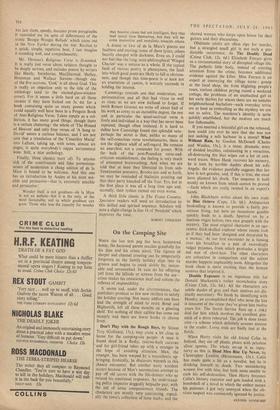On the Camping Site
WHEN the last tent peg has been hammered home, the harassed parent reaches gratefully for his pipe and his crime novel. The rigours of sleeper and channel crossing can be temporarily forgotten as the family holiday slips into its groove and begins to creak slowly by, inexor- able and unremarked. In vain do his offspring yell from the hillside or scream from the sea— crime makes his conscience deaf and softens the reflexes of responsibility.
It seems sad, under the circumstances, that publishers produce so few new thrillers to satisfy the holiday craving. Not many addicts can have had the strength of mind to resist Bond and Highsmith, left all these months on a gloating shelf. Yet nothing of their calibre has come out recently and there are fewer books to choose from.
Don't Play with the Rough Boys, by Simon Troy (Gollancz, 15s.), may come a bit close to home for the camping-site people. A man is found ,dead in a flashy, custom-built caravan and his girl-friend takes up with a stranger in the hope of avoiding attention. Max, the stranger, has been warped by a masochistic up- bringing. Ironically, he discovers warmth in this chance encounter. But another nasty accident occurs becatie of Max's unconscious attempt to pay off old scores with the life-deniers who so twisted his emotional responses. An undergand- ing police inspector doggedly helps■the pair, with the aid of some compassionate friends. The characters are mostly very convincing, especi- ally the town's collection of lame ducks, and the
shrewd woman who keeps open house for their guitars and their discussions.
Obstinate adults are often ripe for murder, but a strangled small girl is not such a pre- dictable occurrence. In The Doubly Dead (Crime Club, 12s. 6d.) Elizabeth Ferrars gives us a circumstantial story of disrupted village life. The pathetic little body, instead of averting attention from the crime, becomes additional evidence against the killer. Miss Ferrars is an expert at conveying the village scene : gossip at the local shop, the frost blighting people's roses, curious children prying round a weekend cottage, the problems of an unattached girl in her early thirties for whom there are no suitable neighbourhood bachelors—such everyday trivia are at least as enthralling as the mystery we are out to solve. The murderer's identity is quite quickly established, but the motives are much less fathomable.
If you married a beautiful girl on the rebound, how could you ever be sure that she was not just seeking a safe harbour in a storm? Wind Without Rain, by Gordon McDonell (Chatto and Windus, 15s.), is a tense, dramatic story of divided loyalties, culminating in a voracious, all-destroying fire that wipes out a lot of awk- ward traces. When Hank recovers his memory, he is torn by terrible doubts about his wife Angela: the evidence painfully suggests that her love is not genuine, and, if this is true, she must have planned his death. The suspense is built mostly on known facts which cannot be proved —facts which are easily twisted in an expert's hands.
John Blackburn writes about his own trade in Blue Octavo (Cape, 13s. 6d.). Antiquarian bookselling is known to provide a fairly pre- carious living, but here an incautious gamble quickly leads to a death. Spurred on by a luscious virgin heiress, two men grapple with the
mystery. The most original character is an ego- centric thick-skulled explorer whose rooms look
as if they had been 'designed and decorated by a maniac.' At our first encounter he is fuming over his breakfast in a pair of exceedingly vulgar pyjamas, from which protrudes a bright red mat of chest-hair. The other characters are colourless in comparison and the salient murder happens implausibly soon. Altogether the book chase is more exciting than the human motives that inspired it.
Double Exposure is an ingenious title for Donald Mackenzie's rather inconclusive story
(Crime Club, 12s. 6d.). All the characters are
subtle shades of grey and their motives are dis- tinctly mercenary. We finish by identifying with Hendry, an accomplished thief who none the less is innocent of the crime they've given him twelve years for. The Secret Service fixes up a risky deal for him which involves the excellent gim- mick of a dress rehearsal. The job is done twice over—a scheme which definitely arouses tension in the reader. Loose ends are badly tied at the finish.
When Harry visits his old friend Colin in Ireland, they eat off plastic plates with priceless silver spoons. The whole set-up is as topsy- turvy as this in Dead Men Rise Up Never, by Christopher Landon (Heinemann, 15s.). Colin has made quite a hit as a novelist, but he is drinking himself. to death. Two smouldering
women live with him, but both seem unable to curb his self-destruction. Then Harry becomes Colin's literary executor and gets landed with a bombshell of a novel in which the author names his poisoner. I got very annoyed when the ob- vious suspect was consistently ignored by justice.
ANTONIA SANDFORD






































 Previous page
Previous page